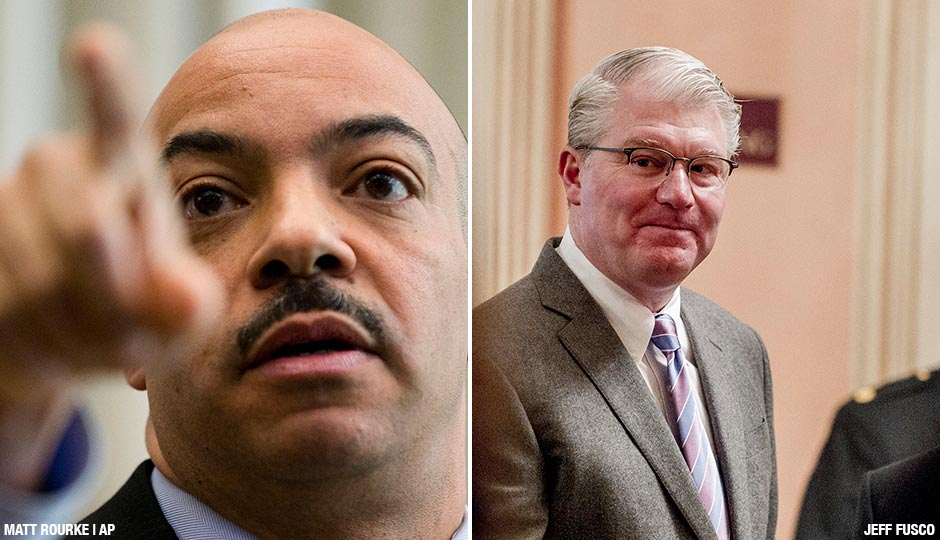Deputy D.A. Recommends Arresting Johnny Doc, Gets Demoted

Seth Williams (left); John Dougherty (right)
Was a high-ranking member of the District Attorney’s Office demoted over a controversial investigation into Local 98 leader John “Johnny Doc” Dougherty?
Multiple law enforcement sources have told Philadelphia magazine that Laurie Malone, a deputy district attorney who oversaw the office’s Pre-Trial Division, was abruptly reassigned to a lower ranking post last month, not long after she recommended filing criminal charges against Dougherty for allegedly punching a non-union electrician at a South Philly worksite in January. The D.A.’s office denies that there was internal disagreement on the matter.
The case has been a political hot potato. District Attorney Seth Williams referred it to embattled state Attorney General Kathleen Kane because of a “long-standing professional relationship” with Dougherty, the D.A.’s spokesman, Cameron Kline, has said. Local 98 has made political donations to Williams in the past.
It was a notable decision for a district attorney who had previously boasted about his willingness to pursue criminal investigations no matter where they lead. “There are no free passes when it comes to political corruption. You don’t get a pass just because you are a friend, or a member of my political party, or race,” Williams said last March, when he filed charges against three longtime Philadelphia politicians who were ensnared in the infamous Tyron Ali bribery case that Kane had refused to prosecute.
But Kane pointed out that she had a similar conflict of interest when it came to Dougherty; she’d also received campaign contributions from Local 98. She tasked other members of the Attorney General’s Office with deciding whether to file charges against Dougherty. The FBI is also investigating the incident, according to an Inquirer report.
Dougherty’s spokesman, Frank Keel, has insisted that the union leader wasn’t the instigator of the winter fistfight, and had only thrown a punch after dodging one himself.
This being Philadelphia, it’ll probably be a little while before the Rock ’em Sock ’em South Philly Throw Down of 2016 gets fully sorted out.
Malone, who has worked for the D.A.’s Office for more than 20 years, is now overseeing private criminal complaints. It’s an assignment that one former city prosecutor, speaking on the condition of anonymity, described as the “Siberia of the office.”
Malone could not be reached for comment.
The D.A.’s Office emailed Philadelphia magazine a statement that read:
“There was never any disagreement within the Philadelphia District Attorney’s Office about whether charges were appropriate in the Dougherty matter. In accordance with the law, the District Attorney made no decision on the matter because of his prior relationship with Mr. Dougherty.
“As soon as the matter was brought to the attention of the District Attorney and his senior staff, they promptly recognized the need to refer the matter to the First Assistant Attorney General, so that an independent determination could be made about the merits of the case.
“That decision was clearly correct as stories like this show that any decision we might have made about the merits of the case would have been attacked as political. Regretfully, the Dougherty matter was not promptly brought to the attention of the District Attorney and his senior staff. The District Attorney took corrective measures to insure that such inaction will not occur in the future.”
It is unclear what delay the D.A. is referring to, and the office declined a request to clarify.
In 2010, Williams promoted Malone from chief of the Repeat Offender’s Unit to bureau chief of the office’s Southwest Division. A year later, he made her a deputy in charge of the the office’s Pre-Trial Division.
Malone’s recommendation to charge Dougherty wasn’t the first time Malone had disagreed with Williams on a high-profile matter. The sources said Malone was also among a small handful of top prosecutors who urged Williams to fire Frank Fina late last summer, after the public got a look at hundreds of pages of pornographic, racist and misogynistic emails that he’d sent and received while working years ago for the state Attorney General’s Office.
Williams offered a lengthy defense of his decision to retain Fina, along with E. Marc Costanzo and Patrick Blessington, two other former state prosecutors who were also linked to the email scandal. He made the three men undergo a day of sensitivity training.
But the D.A. faced considerable backlash from female City Council members and the National Organization of Women for standing by Fina, Costanzo and Blessington. The uproar was about more than just the emails themselves; the messages raised questions about the judgment of prosecutors — and state Supreme Court justices — who trafficked in humor that was demeaning towards women and minorities. Williams ultimately reassigned Fina, Costanzo and Blessington.
News of Malone’s unexpected demotion spread quickly through local law enforcement circles, leaving many surprised.
“Her performance as a deputy when I was in the office was exemplary,” said Ed McCann, a former first assistant district attorney who resigned in November after 26 years in the D.A.’s Office.
McCann, who now works as the first assistant district attorney in Montgomery County, said Malone played an instrumental role in helping the city to land a $150,000 grant last May from the prestigious John D. and Catherine T. MacArthur Foundation to reduce incarceration rates and revamp the local justice system.
“She’s been in the office for over 20 years, and her dedication has never left in the time that I’ve known her,” he said.
Malone, sources said, worked extensively on a hallmark of Williams’s first term — implementing a zone prosecution system, which called for assistant district attorneys to handle cases from specific neighborhoods that they were assigned to across the city.
Malone also oversaw a small team of city prosecutors who were tasked in 2014 with handling Traffic Court cases in the wake of a massive ticket-fixing scandal that all but destroyed the old court.
Follow @dgambacorta on Twitter.


